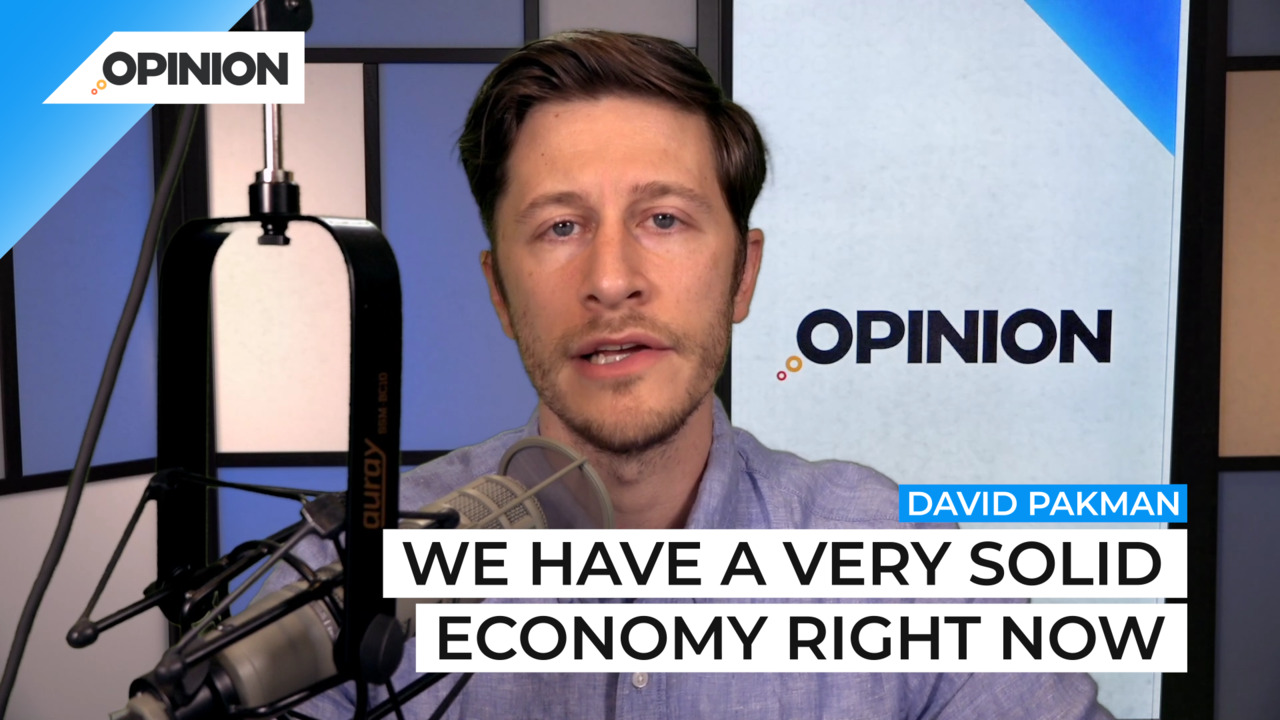
Commentary
-
Our commentary partners will help you reach your own conclusions on complex topics.
This might not be what you’ve been thinking for the last several months. But we objectively have a very solid economy right now. And anybody who knows me knows that I don’t play partisan games with the economy. I know that Democrats and Republicans love to take credit for any positive accomplishment in the economy when their guy is in office. And they love to blame for any negative result in the economy. When it is the other party that controls the White House. The truth is, many of these things have very little to do with the President, at least in a direct sense. And right now, by every objective measure, the economy is quite solid. Now, if it doesn’t feel that way to Americans, it doesn’t matter. And I’m going to get to that in a moment. And in fact, that doesn’t feel that way to many Americans. But let’s look at the different indicators. We are essentially at full employment. last report was 3.5% unemployment, with wages up half a percent in July, and more than 500,000 jobs created in July, when only 250,000 jobs were expected. That’s extraordinary. That’s very, very solid. But what about prices? What about gas prices? What about inflation? Well, the numbers are looking better and better. They’re flat inflation numbers in July, which reduces inflation year over year, by about half a point. So inflation is coming down. We had more than 60 days of consecutive gas price declines. Very welcome. For people who depend on vehicles to commute who do a lot of driving for whom gas is a significant part of the monthly budget. That’s all very, very good. You look at consumer demand, extraordinarily high, you look at companies with the supply chain issues, the much discussed supply chain issues. Part of what that means is consumers are buying so much stuff, that it’s hard to keep products in stock. That’s not the sign of a weak economy. So we have objectively a very solid economy. Is inflation still historically sort of high? Yes. Are mortgage rates higher than they were two years ago? Yes. But they’re still historically quite low. So it’s a very good economy. However, does the average American feel that or believe that or know that? And the answer is not really the pote? The very informal polling I’ve done on my YouTube channel. And the more formal polling that actual professional pollsters have done with the American people show that a relatively small percentage of the country right now feels as though we are in a very strong economy, many people the book is in it’s okay. Or it’s sort of weak. And that is ultimately what matters for voting when James Carville came up with this phrase, it’s the economy stupid, it’s more accurate to say, it’s the people’s perception of the economy, stupid, even though things are looking very good. The stock market has started to perform well, every indicator looks solid. If people don’t believe that things are good, then they’re not going to vote as if things are good. And that’s bad for the party in power in the White House. And that would mean that it’s not so good for Democrats in November. Why would there be such a disconnect? Between the metrics and people’s beliefs? Two basic reasons. Number one, even before the recent turmoil of gas price, and inflation increases, stock market declines, and Pandemic job losses even before that, there were lots of people who are in very precarious financial situations, we know that a huge portion of the country if they have an unexpected $400 expense, they have to borrow in order to cover the expense. Now borrowing could mean putting it on a credit card, right? That’s a form of borrowing. That’s precarious. We know that a huge percentage of the country lives paycheck to paycheck, even when things are good. So one part of this is, even though by historical metrics, the economy is doing very well. We have an economy in the United States with many people that are just barely getting by. So that’s one piece of it. The second piece is media coverage. There is a right wing media apparatus that includes Fox News, Newsmax OA n, right wing talk radio and other areas that have to say the economy is bad, because if they say the economy is good, it’s bad for their claim that Trump was great for the economy and Biden is terrible. And if you go back and look at the historical numbers, you find that just about every economic indicator does better under Democrats. If you look to the beginning, stock market performs better when the President said Democrat, GDP growth is higher when the President a Democrat, job creation is greater when the President a Democrat, unemployment is lower. When the President’s a Democrat, that’s the truth. Those are those numbers. It’s not me giving you an opinion. But there is an entire right wing media apparatus determined not to let people know that because it’s very bad for their perception.
If that Republicans are the ones that are good for business and good for the economy, it’s just not the case. And I challenge you look up the numbers on your own. And if you do that, honestly, you can come to no other conclusion than to the conclusion I’ve come to on average. The economy does better when the President is a Democrat.
-
JD Vance doesn’t add much to Trump ticket
At the 2024 Republican National Convention, GOP presidential candidate Donald Trump selected Sen. J.D. Vance, R-Ohio, as his running mate. With Trump expected to win Ohio in the Electoral College, some observers have questioned why Trump ultimately decided on Vance. One explanation is that Vance said he would have helped Trump overturn the results of…
-
How likely is a landslide victory in November for either candidate?
With President Joe Biden’s poor debate performance and the recent attempt on former President Trump’s life, some Democratic lawmakers are warning of a landslide Republican victory and urging Biden to step aside. But three new major national polls show signs of hope for Biden’s argument that he must remain the Democratic nominee. Watch the above…
-
Should Biden step aside or not?
President Joe Biden looked and sounded notably less healthy than usual during his recent debate against Donald Trump. Biden’s performance set off alarms for some Democrats, who began discussing the possibility of running an alternative candidate. While there may be promising candidates waiting in the aisles, it’s not clear if or how Biden could or…
-
How Biden can win Florida
Donald Trump is currently projected to win Florida again in 2024, just as he did in 2016 and 2020. But, in response to Republican Florida Gov. Ron DeSantis’s legal and cultural war against the Left — including what liberals say is a war on women’s rights, education and free speech — many Floridian voters appear…
-
Donald Trump is mentally unwell
Medical experts and observers have long questioned Donald Trump’s mental and psychological health, with malignant narcissism appearing as the most consistent diagnosis of Trump’s supposed illness. Those discussions have fallen to the sidelines in recent years, but resurfaced in response to certain speeches and behavior from the former president. Watch the above video as Straight…
Latest Opinions
-
 U.S. Department of Defense
U.S. Department of Defense
Congress still trying to figure out how to reduce wasteful military spending
-
 DVIDS
DVIDS
US Navy, Air Force making waves with new weapons at RIMPAC
-
 Getty Images
Getty Images
Israeli PM Netanyahu meets with Trump at Mar-a-Lago
-
 Getty Images
Getty Images
Growing US nuclear power resurgence reaches the nation’s heartland
-
 Getty Images
Getty Images
Beer from the sun, other solar thermal projects get government funding
Popular Opinions
-
In addition to the facts, we believe it’s vital to hear perspectives from all sides of the political spectrum.


